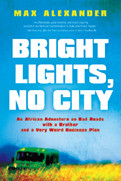Journalist Max Alexander chronicles the true story, with biting sarcasm and deep respect, of his brother Whit’s determination to provide power to the billions of people living without electricity. To do so, Whit moves 7,000 miles from his family and comfortable life in Seattle, convinces his friend and former employee Jan to do the same, and invests more than $250,000 of his own cash (which he earned by co-founding the Cranium board game) to build a Ghanaian social for-profit business called Burro.
If you can get past the frustrating generalizations of Africa in the first few chapters by an author with admittedly no previous experience on the continent, Bright Lights, No City is a rollicking and detailed recounting of what it takes to build a business in a country with no retail infrastructure. Along the way, we learn about Ghana’s history and vibrant cultures. More important to budding social entrepreneurs, the story illuminates the challenges many social enterprises face and the important trade-offs between developing products and delivering products affordably and sustainably to families living on a few dollars per day.
In particular, the book highlights how easy it is to come up with “solutions” to solve developing-world challenges that seem like no-brainers from afar. In Burro’s case, it was replacing low-quality, short runtime, and environmentally hazardous Chinese throwaway batteries—ubiquitously used for flashlights and radios at great expense—with much higher quality, longer run-time, and rechargeable Burro NiMH batteries—eventually at a lower cost than the throwaway batteries. The plan was to reach breakeven while still operating out of the company’s first branch office, before raising investment capital to go national. But it never works like the first business plan.
As Max and Whit share so humorously, it takes years to introduce brands, pioneer technologies, and build distribution channels to communities that lives miles (and thousands of potholes) away from electricity, health care, car repair shops, and stores that carry Parmesan cheese. Technology is almost always the easy part. The difficult challenge, which the story intimately documents, is proving the market demand for your product or service, tweaking the business model to make it profitable, and then proving that you can scale up.
Sounds simple—except it’s Ghana, and you aren’t Ghanaian; it costs millions of dollars, and you have hundreds of thousands; it requires a fleet of experienced sales and marketing professionals, and you’ve got some extremely smart Seattleites with no local language skills and many interns and college grads who have never done this before; and it would be nice to have a few chain stores, but you’ve got tens of thousands of mom-and-pop shops, each with their own needs and capabilities.
The book ends as Whit has expanded beyond just offering the Burro rechargeable battery service, to providing customers with a wide range of solutions, including mobile chargers and an LED light that run on his batteries. Whit has expanded the potential of his hard-earned distribution channel to sell products and services of all kinds. This is precisely the decision I think many social enterprises will have to grapple with in the coming years, as organizations like Burro and d.light (which I co-founded) realize that they cannot afford to do it all. Instead, we need to partner together to build country specific, scalable, and sustainable channels that provide the goods and services consumers want.


